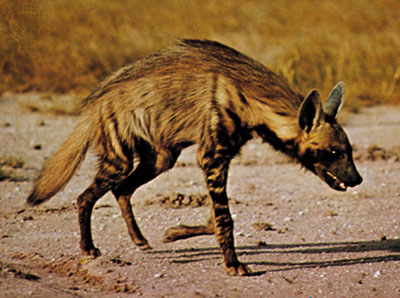The aardwolf or Proteles Cristata is not related to the aardvark but to the hyena. It's name comes from the Dutch/Afrikaan words for "Earth" and "Wolf". Aardwolves are small compared to their relatives, weighing in at 50-60 pounds and standing only 15-20 inches at the shoulder.
This animal is an insectivore, meaning that it's main source of food is insects (mostly termites). This fact distinguishes it from its brethren who are mainly carnivore's. The aardwolf's tongue is long and sticky enabling it to catch termites from their mounds. The aardwolves inhabit the scrub land and plains of Southern and Western Africa. This is the only habitat in which it can thrive because the plains are where to termite mounds are located.
Being nocturnal they sleep in underground burrows all day and wait until nightfall to binge on feasts of termites (up to 200,000 a night!). They may also prey upon small mammals and birds but do not scavenge large animals as other hyena species do.
Adult aardwolves are usually part of a monogamous mating pair, although solitary once mating is done with. At about two years of age the aardwolves reach sexual maturity. Once old enough and paired off, a couple will have about 1-5 cubs. Gestation lasts about 90-110 days after which the cubs will spend about a year living in the den with their parents before leaving the burrow to find a mate themselves.
The aardwolf is not a particularly threatened species but it is feared that the use of poisons in agriculture could affect it's habitat and food sources. There is also a market for it's fur and meat.
Although cute and relatively docile the aardwolf does have a pretty powerful defense mechanism...smell. When threatened an aardwolf will raise it's hackles and secrete a foul, skunky smelling musk that fends off predators.
Images from: http://rzss.wordpress.com/2010/09/
http://simbania.wordpress.com/
http://hyaenidae.org/
This animal is an insectivore, meaning that it's main source of food is insects (mostly termites). This fact distinguishes it from its brethren who are mainly carnivore's. The aardwolf's tongue is long and sticky enabling it to catch termites from their mounds. The aardwolves inhabit the scrub land and plains of Southern and Western Africa. This is the only habitat in which it can thrive because the plains are where to termite mounds are located.
Being nocturnal they sleep in underground burrows all day and wait until nightfall to binge on feasts of termites (up to 200,000 a night!). They may also prey upon small mammals and birds but do not scavenge large animals as other hyena species do.
Adult aardwolves are usually part of a monogamous mating pair, although solitary once mating is done with. At about two years of age the aardwolves reach sexual maturity. Once old enough and paired off, a couple will have about 1-5 cubs. Gestation lasts about 90-110 days after which the cubs will spend about a year living in the den with their parents before leaving the burrow to find a mate themselves.
The aardwolf is not a particularly threatened species but it is feared that the use of poisons in agriculture could affect it's habitat and food sources. There is also a market for it's fur and meat.
Although cute and relatively docile the aardwolf does have a pretty powerful defense mechanism...smell. When threatened an aardwolf will raise it's hackles and secrete a foul, skunky smelling musk that fends off predators.
Images from: http://rzss.wordpress.com/2010/09/
http://simbania.wordpress.com/
http://hyaenidae.org/



No comments:
Post a Comment